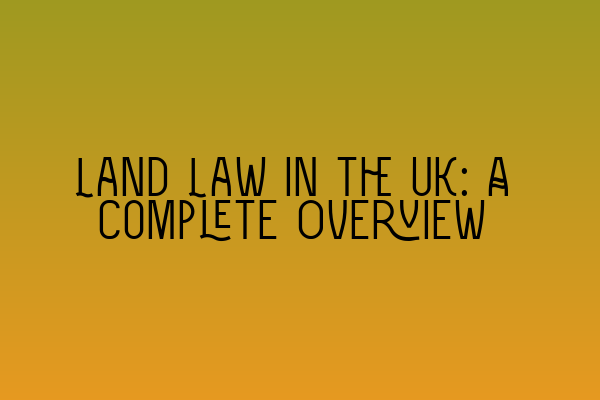Land Law in the UK: A Complete Overview
Introduction
Land law is an essential aspect of property law in the United Kingdom. It encompasses a wide range of legal principles and regulations that govern the ownership, use, and transfer of land and real property. Understanding the intricacies of land law is crucial for individuals, businesses, and legal professionals alike, as it has a significant impact on various aspects of property transactions and land-based activities.
In this comprehensive overview, we will delve into the key concepts and principles of land law in the UK. We will explore topics such as property ownership, leases, easements, covenants, and the registration system. So, let’s begin our journey into the world of land law.
1. Property Ownership
The foundation of land law lies in understanding the different types of property ownership in the UK. There are two primary forms of ownership: freehold and leasehold.
Freehold ownership grants the owner full ownership rights over the land or property. They have an indefinite and exclusive right to possess and use the land, subject to any legal restrictions or obligations.
Leasehold ownership, on the other hand, involves the right to use and occupy the property for a specified period, typically through a lease agreement with the freeholder. Leaseholders have certain rights and responsibilities, but ultimate ownership remains with the freeholder.
2. Leases
Leases are contractual agreements between a landlord (lessor) and a tenant (lessee), allowing the tenant to possess and use a property for a specific period. Lease agreements typically outline the responsibilities of both parties, rent payments, and any restrictions on the use of the property.
It is essential to understand the various types of leases, such as long leases, short leases, and periodic tenancies. Each type of lease has its own legal implications and requirements.
3. Easements
Easements are rights that allow individuals or entities to use another person’s land for specific purposes. They can include rights of way, rights of light, rights to access, or rights to use services (such as water or electricity) across another person’s land. Easements are often essential for the development and practical use of properties, and their creation and enforcement are governed by specific legal principles.
4. Covenants
Covenants are legally binding agreements or promises related to land use and property obligations. They may be positive (requiring the doing of certain acts) or negative (restricting certain actions or uses). Covenants are often placed on properties to regulate land use, maintain certain standards, or protect the rights and interests of neighboring properties.
Understanding the enforceability and implications of covenants is crucial for landowners, as they can affect property value and use.
5. Registration System
The UK operates a comprehensive land registration system, known as the Land Registry. The primary function of the Land Registry is to maintain an official record of land and property ownership, including details of any mortgages, charges, easements, or other legal interests affecting a property.
The registration system provides transparency, security, and legal protection for property owners and those dealing with land transactions. It is mandatory to register a property with the Land Registry when it undergoes a change in ownership or when certain other events occur.
Conclusion
Land law plays a pivotal role in the UK’s property market and legal landscape. From property ownership and leases to easements, covenants, and the registration system, understanding the complexities of land law is essential for anyone involved in property transactions or land-based activities.
This overview has provided a glimpse into the key concepts and principles of land law in the UK. However, it is important to note that this is just the tip of the iceberg. For a more comprehensive understanding and practical application of land law, I encourage you to explore our SQE Property Law and Land Law courses.
If you’re preparing for the SQE 1 exam, be sure to check out our practice exam questions and mock quizzes. For those aiming to excel in the SQE 2 exam, we offer dedicated preparation courses. Stay up to date with the latest SRA SQE exam dates to plan your study schedule efficiently.
Feel free to reach out to us at SQE Property Law & Land Law for expert guidance and support in navigating the fascinating world of land law in the UK.
Related Articles:
– SQE 1 Practice Exam Questions
– SQE 1 Practice Mocks FLK1 FLK2
– SQE 2 Preparation Courses
– SQE 1 Preparation Courses
– SRA SQE Exam Dates
